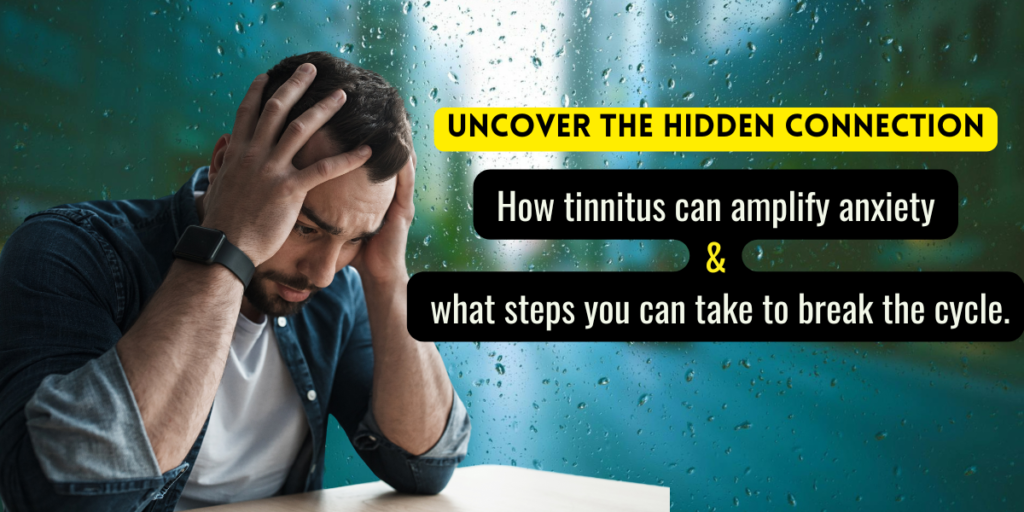
Tinnitus and Anxiety: Understanding the Connection
Tinnitus can be a frustrating experience, often causing a persistent ringing or buzzing in the ears. But did you know that it can also be linked to anxiety? In this post, we’ll explore how tinnitus and anxiety are connected, the impact they can have on your life, and some actionable steps you can take to manage these issues. Plus, we’ll introduce you to a supplement that may help: Quietum Plus.
What is Tinnitus?
Tinnitus isn’t a condition itself but a symptom of an underlying issue, often related to hearing loss, ear injuries, or certain health conditions. It manifests as sounds like ringing, buzzing, hissing, or clicking in the ears. For many, these sounds can be constant or intermittent, and they can vary in volume.
Can Tinnitus Cause Anxiety?
Yes, tinnitus can lead to anxiety for many people. The constant ringing or buzzing in the ears often creates frustration and helplessness, especially when it disrupts daily life or sleep. This ongoing stress can heighten anxiety, leading to worries about health, social situations, and concentration. Unfortunately, increased anxiety can amplify the perception of tinnitus, creating a challenging cycle.
To address this issue effectively, consider the Quietum Plus supplement. Designed to support tinnitus relief, Quantum Plus combines natural ingredients that may help reduce the severity of symptoms and promote overall well-being. By tackling both tinnitus and anxiety, you can take an important step toward reclaiming your peace of mind.
How Does Anxiety Fit In?
Anxiety can significantly amplify the experience of tinnitus. When you’re anxious, your body goes into fight-or-flight mode, which can heighten your awareness of sounds, making the ringing in your ears feel more intense. Here’s how the two are connected:
. Heightened Sensitivity:
Anxiety can make your brain more sensitive to external stimuli, including the sounds associated with tinnitus.
. Stress Response:
Stress can exacerbate tinnitus symptoms, creating a cycle where anxiety leads to more stress, which then worsens tinnitus.
. Sleep Disruption:
Anxiety often disrupts sleep, and lack of rest can make you more aware of tinnitus sounds, creating further anxiety.
Managing Tinnitus and Anxiety
While managing tinnitus and anxiety can be challenging, there are several effective strategies you can adopt:
- Mindfulness and Relaxation Techniques
Practicing mindfulness can help reduce anxiety and, in turn, alleviate the perception of tinnitus. Techniques such as deep breathing, meditation, or yoga can create a sense of calm and make the sounds less intrusive. - Sound Therapy
Sound therapy involves using external noise to help mask the tinnitus sounds. This can include white noise machines, gentle music, or nature sounds. Finding the right background sound can help you focus less on the ringing. - Cognitive Behavioral Therapy (CBT)
CBT is a psychological approach that helps change negative thought patterns. It can be beneficial for those struggling with the emotional aspects of tinnitus and anxiety. A trained therapist can guide you through techniques that can help reduce the distress caused by both conditions. - Stay Active
Regular exercise can help manage both anxiety and tinnitus. Physical activity releases endorphins, which are natural mood lifters, and can also help reduce stress. Even simple activities like walking or stretching can make a difference. - Limit Caffeine and Alcohol
Both caffeine and alcohol can increase anxiety and may also worsen tinnitus symptoms. Reducing your intake of these substances can lead to a more balanced emotional state and potentially lessen the impact of tinnitus.
Introducing Quietum Plus
For those looking for additional support in managing tinnitus, consider Quietum Plus. This natural supplement is designed to support ear health and improve overall auditory function. Many users have reported positive effects on their tinnitus symptoms after incorporating Quietum Plus into their routine.

Quietum Plus contains a blend of herbs and nutrients that work together to target the root causes of tinnitus. By supporting your auditory system, it can help reduce the ringing in your ears and, in turn, alleviate some of the anxiety associated with it. If you’re seeking a natural way to support your journey with tinnitus, Quietum Plus might be worth exploring.
FAQ about Tinnitus and Anxiety
Q: Can anxiety cause tinnitus?
A: While anxiety doesn’t directly cause tinnitus, it can worsen the perception of it. Increased stress and heightened sensitivity can make the sounds more noticeable.
Q: How can I stop focusing on my tinnitus?
A: Try engaging in mindfulness exercises, sound therapy, or cognitive behavioral therapy. Keeping busy with activities you enjoy can also help distract you from the sounds.
Q: Is tinnitus a serious condition?
A: Tinnitus itself is not usually a serious medical condition, but it can be a symptom of underlying issues. If it affects your quality of life, it’s important to seek medical advice.
Q: Can Quietum Plus help with anxiety related to tinnitus?
A: Many users report that Quietum Plus helps reduce their tinnitus symptoms, which can lead to decreased anxiety. However, it’s best to consult with a healthcare professional for personalized advice.
Q: Are there any lifestyle changes that can help with tinnitus?
A: Yes! Reducing caffeine and alcohol intake, practicing relaxation techniques, and maintaining a healthy lifestyle can all contribute to managing tinnitus and anxiety.
Conclusion
Tinnitus and anxiety are closely linked, creating a challenging cycle for many individuals. However, with the right strategies and support, you can manage both effectively. Incorporating mindfulness techniques, sound therapy, and even considering supplements like Quietum Plus can lead to improvements in your symptoms. Remember, it’s important to seek professional help if your tinnitus or anxiety feels overwhelming. Take care of yourself, and know that there are ways to find relief.
